In 1968, an intrepid teenager named Mary White began her first forays into Cannabis. Not one for drinking, White discovered that taking on what she calls “mild happy weed” was enough to keep her in fashion without the side effects of hellish hangovers. Like many teenagers, her consumption was sporadic throughout high school and further waned as she reached her 20s and 30s.
“I enjoyed Cannabis, but it wasn’t something that I thought about much. It was kind of just something you do at parties when you’re young. I never thought I’d end up working with it,” explains White.
Little did she know, 16 years after her first toke, Cannabis would be her ticket out of bankruptcy.
“It’s a horrible, long story, but basically I got really sick and had no insurance in 1984. I was in dire straits and needed money, so I reached out to some people I knew who were operating illegal grow houses in Seattle,” says White. “I didn’t sell it; I just took care of the plants, but that helped lift me out of bankruptcy, and I was able to buy a house.”
At the time, White says she felt empowered and strong despite being the token female within the grow operation. She loved taking care of the plants and often referred to them as her babies. Illegality aside, White had found herself in the kind of self-sufficient position that still eludes many working women today.
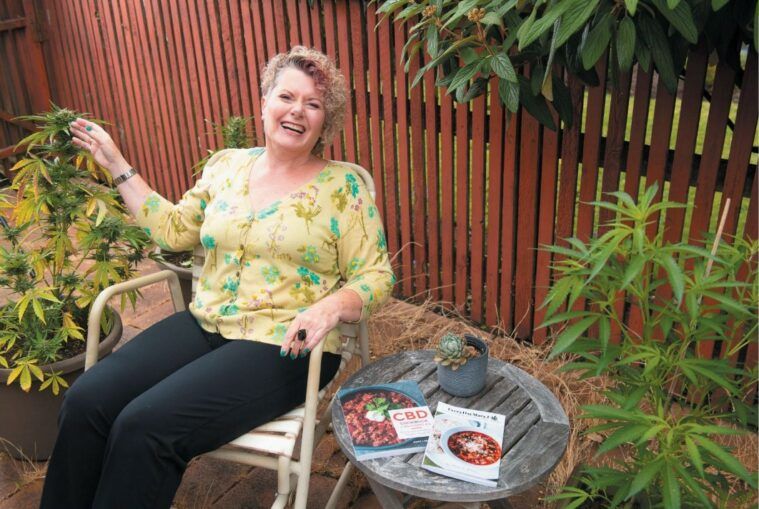
“I was happy and I felt secure, but now looking back at it, I was the only woman – and I did kind of get forced out of a job as soon as there was a man who could do my job. It’s funny how you don’t think about that kind of stuff when it’s happening,” says White.
Sadly, White is one part of a pervasive narrative that still exists within today’s legal market. Despite being a small business owner and published author, White says that feeling like an outsider is part and parcel of being a woman in the industry.
“I am teaching cooking classes, which is traditionally thought of as a woman’s job, but there are a lot of times I feel really out of place. I’m already older than most of the people I work alongside in the industry, and then I am a woman on top of that. So sometimes I wonder if I’m not just some weirdo lady hanging around with the guys,” explains White.
A MALE-DOMINATED INDUSTRY
According to a 2017 study by MJBiz Daily, women occupy roughly 36-percent of executive positions within the industry. So why, if every piece of Cannabis we consume is female, are women taking a backseat to their male colleagues?
MJBiz Daily suggests that the recurring issue preventing women from entering the industry is a lack of access to capital. The amount of money needed to start a Cannabis business can easily surpass six figures, and the networks of investors that can provide that amount of money – high-net-worth individuals and venture capital firms – can be difficult for women to access. Additionally, women-owned businesses often receive less funding and fewer resources than their male counterparts. It’s something that Caroline Frankel has experienced first-hand.
Massachusetts’ first recreational dispensary owner, Frankel, spent years scraping together $300,000 of her own money to open her Uxbridge store.
“You really don’t hear about women self-funding their marijuana business, and it’s something I’m proud of,” says Frankel.
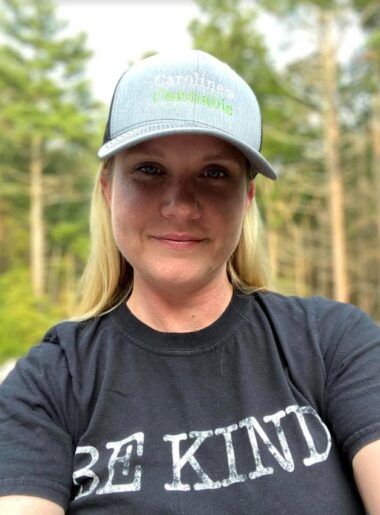
“You really don’t hear about women self-funding their marijuana business, and it’s something I’m proud of.”
Caroline Frankel
A stay-at-home-mother, Frankel says she would put her three children to bed and retire to her basement, where she spent hours following the legalization process as it moved from the West Coast to New England. Putting her business degree from Johnson and Wales University to good use, Frankel developed a comprehensive business plan for her dream dispensary. She also navigated the licensing process mainly on her own.
“When the state was ready for general applicants like myself, I was ready to go. I actually ended up being the first general applicant in Massachusetts,” says Frankel.
In early April 2020, Frankel opened Caroline’s Cannabis, and she now has plans to expand to a second location. However, Frankel’s success has been somewhat tempered by the response she has received from other mothers within her community.
“Of course, my kids love me regardless. But with other moms, I definitely felt like I was being judged a little bit for not only being someone who uses Cannabis, but then also being someone making a living in it as well. It was always the other parents or the people in my community that I felt judged me a little bit more than anyone else,” says Frankel.
JUMPING HIGHER HURDLES
Canadian physicist Donna Strickland famously received a Nobel Prize before being promoted to full professorship at the University of Waterloo in Ontario, Canada in 2018. Some claimed that Strickland’s experience is the quintessential example of women being held to impossible standards within the workplace. However, Strickland eschews such notions and says that she didn’t receive a promotion because she never asked.
Strickland’s story resonated with many women who said that they often feel that they need to do more and jump higher hurdles than their male counterparts to prove their worth in the workplace. Unfortunately, the Cannabis industry isn’t exempt.
“I totally have always felt that I’ve had to work harder because Cannabis is a male-dominated field. Even from the municipality and licensing standpoint, I was spending a lot of time rehearsing my presentations and investing money into making them look better than anyone else’s. I always felt like I had to compete more,” Frankel explains.
Some feelings of inadequacy might be understandable in Frankel’s case, as she was cutting a new path for women-owned dispensaries in a newly legalized state. But the pervasive bias that White felt 30 years ago is the same one that women in the industry continue to butt up against.
As a former ice hockey goaltender, Oregonian Megan Hunt is used to being the only woman among a sea of men, so she felt at home when she entered the industry as a trimmer in 2018. At the time, Hunt had several female coworkers trimming alongside her, but as her ambitions to rise within the ranks took hold, she began to realize that her perception of gender equality had been somewhat skewed.
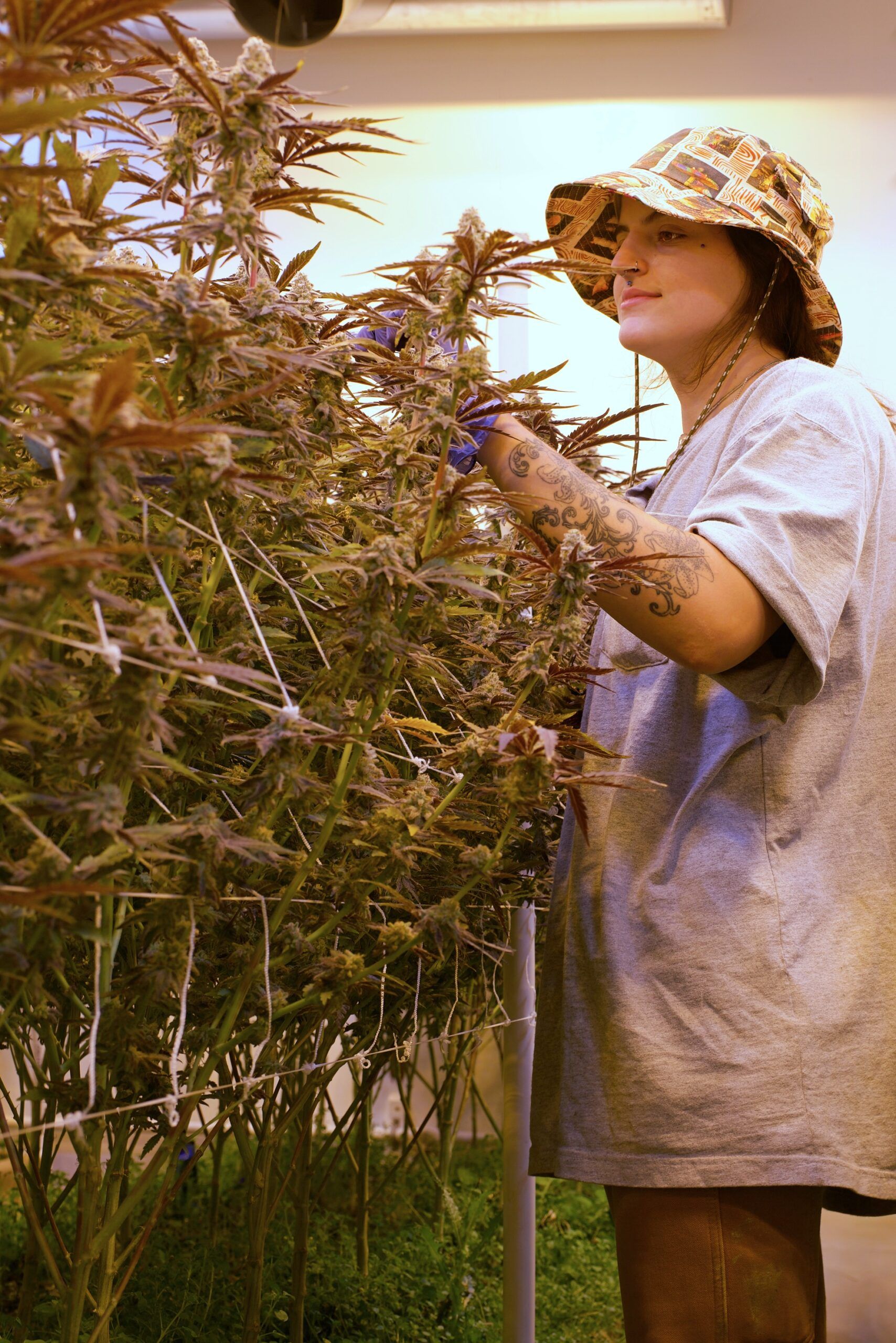
“There are women that do trimming, production or processing, but I don’t really see a ton of women growing. I feel like there has to be a ton out there, but just in my personal experience, I haven’t really worked with a lot of other female growers. I’ve learned almost everything from male growers,” explains Hunt.
Although Hunt says her male mentors and colleagues have always treated her with respect, she still experienced pushback when she expressed her desire to take on a leadership position within the grow operation.
“I definitely feel like there’s a period of time where you have to prove yourself in any position, but I do think you end up getting undermined a lot more in fields that are predominantly male. You have to prove yourself and let them know, ‘Hey, I know my shit. I can grow and I can do everything you can do. Including lifting a five-gallon bucket of water.’ Once you get through that, it’s usually pretty smooth sailing,” says Hunt.
SHIFTING THE NARRATIVE
While Hunt has cemented her place in the industry as Tao Gardens’ Director of Propagation, she remains part of an exclusive club of women who have broken through the proverbial glass ceiling.
“I mean, it’s … it’s kind of confusing to me because I know that a lot of women are into plants and love biology and healing with herbal medicine. And so, it’s kind of a perplexing question to me as to why more women aren’t taking those leadership positions or just growing in general,” says Hunt.
One theory is that there remains a stigma around female Cannabis consumption. Currently, male consumers make up nearly three-quarters of the recreational market. As was the case with Frankel, the notion of being a woman and mother are so tied together that society struggles to separate the two. So, when a stay-at-home-mom decides to open a dispensary, it seems shocking in a way that it would not be, had it been a stay-at-home-father.
“I think [the Cannabis industry] can be a little daunting. Cannabis has still been a stigma for so long, so I think women may still be a little hesitant about it. For women, it’s still high risk because it’s federally illegal. So, you just might not have those women executives that want to take that risk at this time,” explains Autumn Brands co-owner and CFO Autumn Shelton.
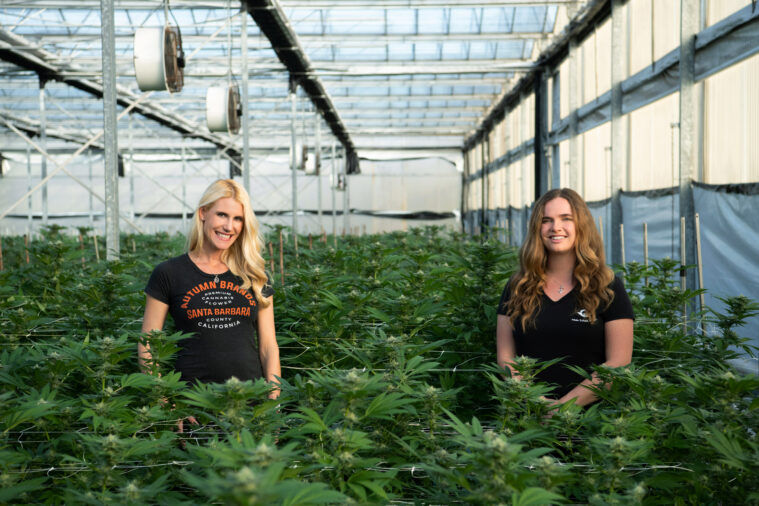
One of California’s first women-owned Cannabis businesses, Autumn Brands has made it their mission to bring more women into the industry and destigmatize female Cannabis use. According to Shelton, achieving their goals comes down to re-branding.
“Women traditionally are the ones that make decisions for health and wellness for themselves and for their families, and they are really dedicated to that. So when we think about Cannabis, we think about it as a health and wellness product. And that extends to our packaging and our branding,” says Shelton.
A mother and Cannabis consumer, Shelton understands the importance of shifting the stoner narrative that has been perpetuated by pop culture.
“It’s about normalizing Cannabis in the way a glass of wine has been. I think the perception is that all pot consumers are getting super high on bong rips, and that needs to change. Of course, when I was younger, I used to do that – but I am a mom now, and that has shifted how I think about Cannabis. Now, all I need is a few hits of a joint, and it allows me to get out of my head and release tension so I can come back and be ready to be a mom again,” explains Shelton.
Even though Shelton is fighting for the normalization of not only female Cannabis use, but women occupying space in the industry, she admits that it can be difficult finding a balance.
“It can be confusing when you’re a parent, because on one hand society says that Cannabis is something that is not good, and on the other hand, your child is wondering why you would work in a business that is surrounded by it,” says Shelton.
CREATING THEIR OWN SPACE
The struggle to reconcile years of cultural programming with the reality of Cannabis as medicine is something that Alaskan Jana Weltzin was confronted with at a very young age, and it ended up shaping her life
“When I was seven or eight, I had a childhood friend who saw her parents get arrested for marijuana possession. I remember it being weird to me – here was this perfect family that was so happy and healthy and took care of their kids, and took care of me when I stayed with them – getting ripped apart by the cops. After that, I knew I wanted to be a lawyer, and I had no other intentions of doing anything else,” says Weltzin.
The founding member of JDW Counsel in Anchorage, Weltzin focuses her legal practice on land use and zoning law, recreational marijuana business law, and regulation compliance in Alaska. A staunch advocate for the industry, she was instrumental in working with the Coalition for Responsible Cannabis Legislation to help launch Alaska’s recreational market in 2015.
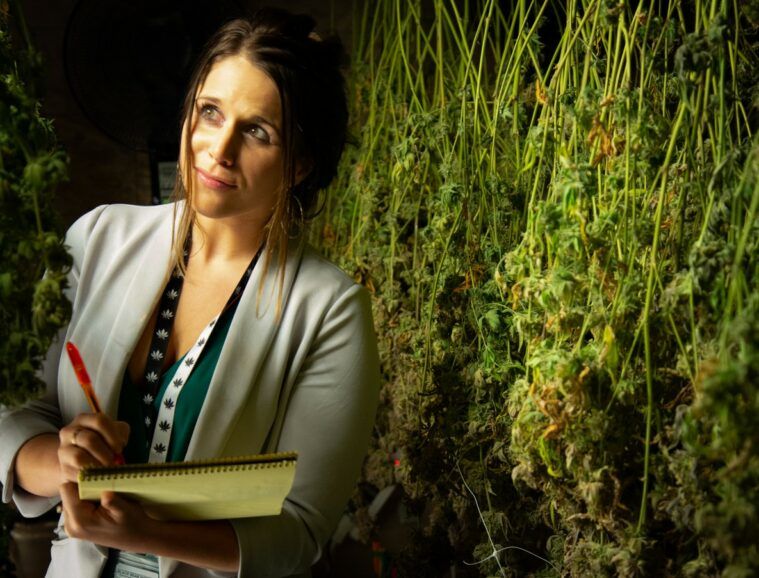
Over the last six years, Weltzin has established herself as a powerhouse Cannabis attorney, but she is quick to give credit to the female mentors who helped pave the way for her.
“I learned from my mentor Jordan Rose. Especially when it comes to my dealings with men, I remember she would always tell me to be realistic about what a man’s priorities are with you. You want to get the most you can out of the relationship without ever compromising your own values and your own beliefs. So, you have to be okay with their reaction when you set a hard line,” says Weltzin.
Known for her direct, firm communication, Weltzin ruffled some feathers when she began carving out space for herself.
“I think that men came in with a different expectation and maybe thought that I couldn’t handle getting certain code amendments, but I did. Some thought that I couldn’t handle getting certain approvals done, but I’ve gotten every single necessary approval out there for marijuana shops. I think it took me showing them that I can do it; I’m not just this little girl trying to make it in a big man’s world,” says Weltzin.
While Weltzin has played the game, she is adamant that she should not have had to clear extra professional hurdles simply because she is a woman.
“What are we not hearing collectively as a society? Why are things tone-deaf when women speak and not when men speak next? I don’t know if that’s a ‘man issue,’ though. I think it might be more of a societal issue that needs to be corrected,” says Weltzin.
So, how does the Cannabis industry become a shining example of equality for women? On this matter, Weltzin, Hunt, White, Frankel and Shelton agree.
“We have to step up and have each other’s back. Men have been doing that for decades and decades, and as women, we haven’t. We’re conditioned not to like each other; we are conditioned to be competitive with each other. The reality is that we shouldn’t be competing with each other. We have to be the ones to say where our place is,” says Weltzin.







